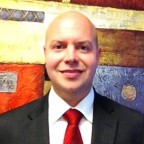Updated
Mohamed Abdelaziz: Portrait of an Authoritarian-In-Chief – Jordan Paul
.
* “The truth is that his 37-year rule has been marked by Soviet-style indoctrination programs, systematic abuse of foreign aid, and rigid limitation on freedom of movement that has led to “warehousing” of tens of thousands of Sahrawis in the refugee camps he controls.” *
.

Jordan Paul, Executive Director, Moroccan American Center for Policy
Jordan Paul, MACP
February 23, 2014
Though he has been in the public eye for 37 years as the man at the epicenter of the Western Sahara conflict, Mohamed Abdelaziz, remains largely mysterious.
Having spent almost four consecutive decades as self-styled President of the so-called “Sahrawi Arab Democratic Republic,” Abdelaziz is in the record books with some not-so-lovely company as the second-longest serving non-royal ruler currently still in power.
Also holding the title of Secretary General of the Polisario Front, Abdelaziz is among a group of revolutionary leaders who rose to prominence in the vacuum of the Cold War.
Born in Marrakesh in 1947 to a Sahrawi family of the eastern Rguibat tribe, he began to radicalize while at Mohamed V University in Rabat, where he met fellow Rguibi tribe member El-Ouali Mustapha Sayed — then a law student and eventual founder of the Polisario Front.
Despite this connection, Abdelaziz “did not belong to the very closed circle of the organization’s founders,” according to a report by the European Strategic Intelligence and Security Centre (ESISC).
So, it was a curious development that in 1976 Abdelaziz was chosen to lead the movement and the SADR. Many familiar with the history believe that Algeria, key backer of the group, played a role in Abdelaziz’s selection.
His personal history and his ascension to power may be somewhat shrouded, but there is no mystery about the nature of his regime, given the absence of opposition candidates in his supposedly “democratic elections,” and the dictatorial powers he has wielded for 37 years.
The truth is that his rule has been marked by Soviet-style indoctrination programs, systematic abuse of foreign aid, and rigid limitation on freedom of movement that has led to “warehousing” of tens of thousands of Sahrawis in the refugee camps he controls.
Indeed, the regime “has not lived up to its ideals…[there is] an authoritarian top-down rentier state and rampant tribalism and corruption in the refugee camps under the dictatorship of Mohamed Abdelaziz,” according to Stephen J. King’s 2014 essay, The Emergence and Politics of the Polisario Front.
Even more bizarrely, according to King, despite its authoritarian practices, the Polisario have managed to cultivate a reputation for “democratic practices and an egalitarian ethos.” A truly confounding idea, given what the world has been able to see of the Polisario all these years.
It may never be known exactly how Abdelaziz came to acquire and hold onto power for 37 years, though it is exceedingly clear through the conduct of his regime what kind of leader he is.
In this often-neglected conflict, it is important that the regime be recognized by the international community for what it is, and not some idealized version of it that doesn’t match up with the facts on the ground.
Jordan Paul is the Executive Director of the Moroccan American Center for Policy.